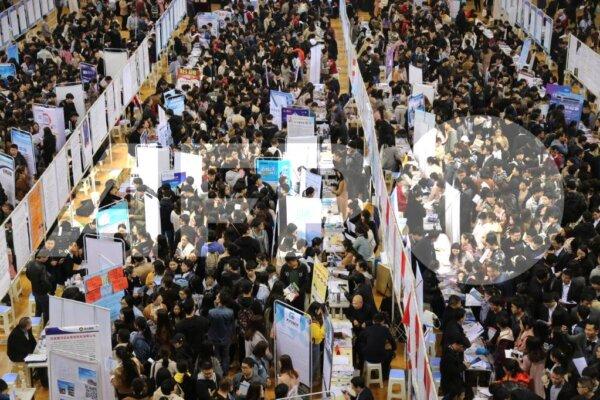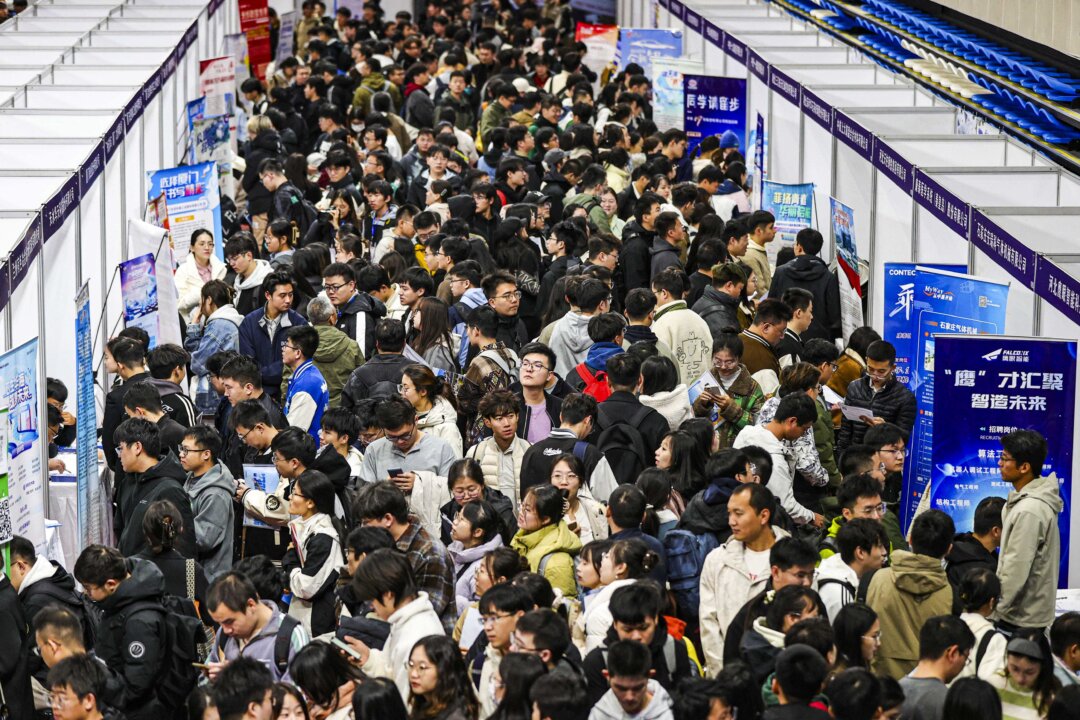The job applications in the public sector have hit a record high amid China’s unemployment crisis and gloomy economy.
For the 39,700 job positions in central government agencies opening up in 2025 in China, 3.25 million applicants are competing—with registrations for China’s national civil service examination having closed on Oct. 24.
The Chinese communist regime’s government jobs have for the past decades been considered by Chinese as “iron rice bowls” for their job security, stability, and benefits.
The number of applicants this year has set a new record high, with an increase of more than 340,000 from last year.
The most competitive position has drawn 16,700 applicants. It’s a staff member position in the Liaison Department of the China Vocational Education Society, as the requirements for this position are relatively loose, with minimum requirements being a university bachelor’s degree that is open to a wide range of majors. There are no restrictions on grassroots work and no household registration restrictions. Candidates from all over China are eligible to apply, according to major Chinese financial media Yicai.com.
The largest number of applicants by city was 250,000 in Guangdong, followed by 230,000 in Beijing. But the fiercest competition is in Tibet, with an average of 150 people competing for one position.
Currently, the unemployment rate among young people aged 16 to 24 in China, excluding students, remains over 17 percent, and the corresponding number of unemployed young people may reach more than 30 million, according to estimates by Chinese media.
Meanwhile, China’s GDP grew by 4.6 percent in the third quarter, below the 5 percent official target and marking the lowest since 2023. The continued economic decline has made the job market even bleaker.
In recent years, China’s civil servants and government employees have had their salaries significantly reduced, and some have had to retire early, due to the huge CCP government debts that are still accruing.
Despite the declining salaries of civil servants, “the high unemployment rate among young people, especially the unresolved employment problem of fresh graduates, has prompted many young people to consider civil service examinations as their last option for job stability,” Sun Kuo-hsiang, a professor of international affairs and business at Nanhua University in Taiwan, told The Epoch Times on Oct. 26.
As to the salary cut of civil servants in many places in China, Sun said it mainly reflects China’s economic structural problems and financial pressure.
“The fiscal pressure on China’s local governments has been increasing in recent years, especially due to the impact of the real estate market downturn, COVID-19 control expenditures, debt burdens, etc. The revenue of many local governments is insufficient to support their original expenditure levels,” Sun said.
“The salary cuts reflects the reduction of local government revenue and the increase of debt burden.”
China’s new college graduates reach 11.79 million in 2024, and the expected number of college graduates in 2027 is close to 14 million. Xu Zhen, a senior professional in China’s capital market, told The Epoch Times on Oct. 26 that compared to the huge number of graduates, the civil service examination for the limited government jobs is “basically for show and cannot solve major problems. Moreover, there are many deals behind the scenes.”
Xu said that the lasting high unemployment crisis reflects the severe situation of China’s economy caused by “the CCP’s administrative intervention. The real estate industry has a huge impact on the economy and it started to decline in 2017. The digital economy cannot fill the vacuum left by the real estate recession.”
Sun noted that the CCP’s stimulus policy has not shown any effect to the real economy.
“At present, China’s small and medium-sized enterprises and private enterprises still face financing difficulties, and there is insufficient demand in many industries, thus affecting economic growth and employment growth. When policies fail to bring about new job opportunities quickly and effectively, it becomes a rational response for young people to choose more stable civil service positions. The key is that whether China’s economy can have structural reforms.”

Xu pointed out that the Chinese economy is “a transfusion economy. Once overseas investment and export orders decrease, the Chinese economy will have problems.”
He said, “The decrease in export orders, the withdrawal of foreign capital, and the continued economic downturn have brought about a wave of bankruptcies and unemployment in private enterprises. The internal causes are administrative intervention, the decline of the real estate industry, and the rise of artificial intelligence, which have caused a wave of bankruptcies and unemployment in the private economy. These are like dominoes and have spread to various industries, regions, and aspects. The CCP’s economy is already terminally ill.”
Xu advised people who are unemployed and recent graduates to have a clear understanding of the CCP’s economy.
“Perhaps some people still have illusions about it. The current series of CCP operations that are against market rules, such as lowering interest rates and reserve requirements, converting debt into stocks, and establishing a combined police-tax operations; are all centered around squeezing the last wealth out of the people. If you don’t have a job, perhaps doing nothing and reducing spending is the best option.”
His suggestion for new graduates is to “recognize the economic situation, lower expectations, survive first, be kind to people and things around you, and be tolerant when encountering things. Most importantly, you should see through the CCP, which is the root of all sufferings of the Chinese people.”
Luo Ya contributed to this report.

